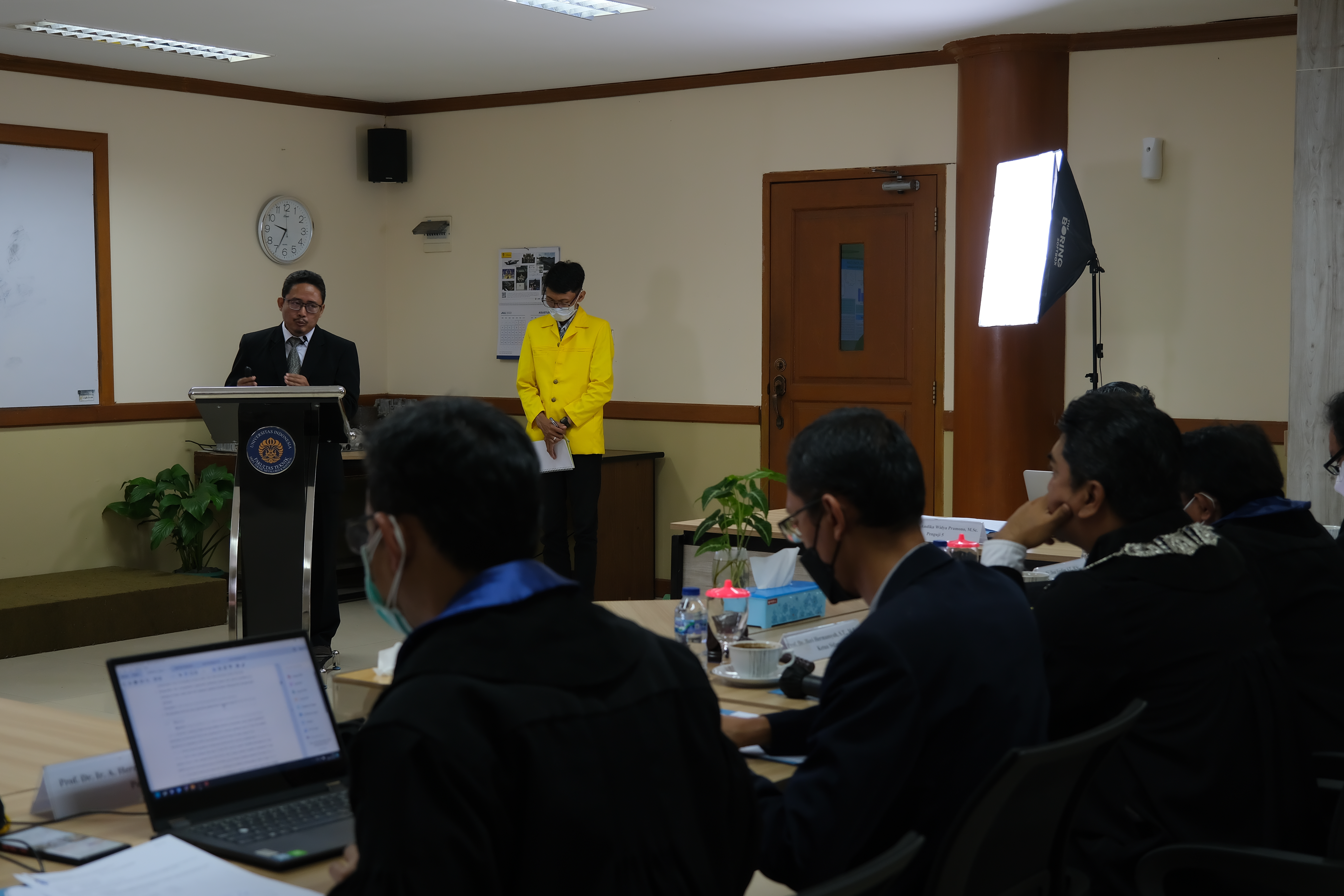The Faculty of Engineering, Universitas Indonesia (FTUI) awarded a doctorate to one of the Doctoral students of the Department of Metallurgical and Materials Engineering (DTMM) FTUI, Cahya Sutowo. Through his dissertation entitled “Manufacture and Development of New Ti-Mo-Nb-Based Titanium Alloys with the Addition of Sn and Mn Elements with In Vitro Characterization for Medical Implant Material Applications”, Cahya officially completed his Doctoral education at DTMM FTUI, on 4 July 2022. Cahya is listed as the 55th doctoral graduate of the Metallurgical and Materials Engineering Department and the 460th doctoral graduate of the Faculty of Engineering, University of Indonesia.
This Doctoral promotion exam is promoted by Prof. Dr-Ing. Ir. Bambang Suharno, M.Sc., Permanent Professor of DTMM FTUI and co-promoter by Dr. Sugeng Supriadi, S.T., M.S.Eng., from the Department of Mechanical Engineering (DTM) FTUI. In addition, there are also several test teams consisting of Prof. Dr. Heri Hermansyah, ST., M. Eng., Prof. Dr. Ir. Akhmad Herman Yuwono, M.Phil.Eng., Prof. Dr-Ing. Andika Widya Pramono, M.Sc., Drs. Nofrijon Sofyan, M.Sc., Ph. D., Dr. Ir. Donanta Dhaneswara, M. Si., and Dr. Deni Ferdian, ST, MSc.
The research conducted by Cahya started from the current condition of Indonesia, which is a member of the G20. An increasing economy and population size is an attractive combination, in that there is a potential need for biomaterials for the elderly population with increasing life expectancy. This population increase has an impact on the increase in the elderly population and degenerative diseases, such as osteoporosis.
“To support the need for implant materials, research and development of titanium alloy-based biomaterials are necessary. However, the problem of the content of Al and V metals which are potentially harmful to the human body, and the value of the modulus of elasticity which is still far compared to human bone, finally prompted Cahya to develop a new titanium implant alloy to replace Ti6Al4V. The Ti-Mo-Nb alloy with the addition of Sn and Mn is an element that is safe to use and has a lower modulus of elasticity than Ti6Al4V,” said Cahya.
In addition, the main objective of this research is to develop permanent implant materials for the application of stem hip joint components from titanium alloy type with low modulus of elasticity through the addition of beta-phase stabilizer elements at low cost.
This research combines Ti-Mo-Nb-Sn-Mn made by smelting using an electric arc vacuum furnace in an inert argon gas environment. The melted ingots were homogenized at a temperature of 1100°C. This inert condition for 7 hours, then continued with water cooling. Then, characterization of the microstructure, mechanical properties, corrosion properties, and in vitro was carried out to determine the properties of the resulting application.
“The design of the Ti-6Mo-6Nb-8Sn-4Mn alloy, which is the optimum composition achieved. This alloy has a modulus of elasticity of 92.4 GPa, a corrosion rate of 0.00160 mmpy, and cell visibility of up to 100%. Therefore, it can be concluded that the mechanical properties, corrosion behavior, and in vitro cell test results indicate that the alloy is better than the commercial Ti6Al4V alloy and is an attractive candidate for medical implant application materials,” concluded Cahya.
***
Public Communication Bureau
Faculty of Engineering, Universitas Indonesia

